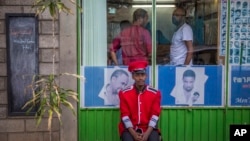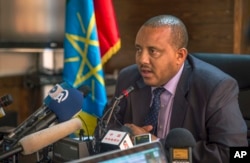The Ethiopian government is blaming regional rival Egypt for supporting rebels and forcing Addis Ababa into declaring a state of emergency Sunday.
“We have ample evidence that trainings have happened, financing has happened in Egypt, the jury is still out whether the Egyptian government is going to claim responsibility for that,” Ethiopian government spokesman Getachew Reda told reporters Monday.
Egypt last week denied any support for the Ethiopian rebels.
Egypt and Ethiopian have been locked in a dispute over the waters of the Nile River. Egypt claims the hydroelectric dam that Ethiopia is building on the river will greatly reduce its share of the river’s flow.
Getachew said the six-month state of emergency allows the government to deal with the banned Oromo Liberation Front, or OLF, that organized a series of attacks last week across Ethiopia’s most populous region, Oromia.
“We know for a fact that the terrorist group OLF is receiving all kinds of support from Egypt,” Getachew said.
At least 400 people have been killed in anti-government protests in the past year, human rights groups and opposition activists have said. The protesters have been demanding wider freedoms in a country that is a close security ally of the West and one of Africa’s best-performing economies.
On October 2, more than 50 people were killed in a stampede after security forces opened fire on anti-government protesters during a religious festival in Bishoftu, southeast of the capital.
The incident sparked more violence in Oromia, where farms, factories and government buildings were torched last week.
The state of emergency will not mean a total ban on civilian rights and there will not be a blanket curfew across the country, Getachew said.
“This is not an attempt by the military to take over,” he added.
The government has said the state of emergency may include a curfew in some locations, arrests and search-and-seizures without a court order, restrictions on the right to assembly and a ban on some communications.
The six months is the longest that Ethiopia allows for a state of emergency, but it can be renewed.






